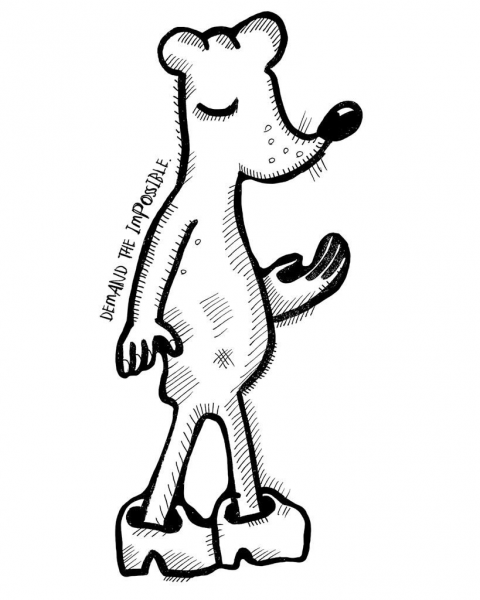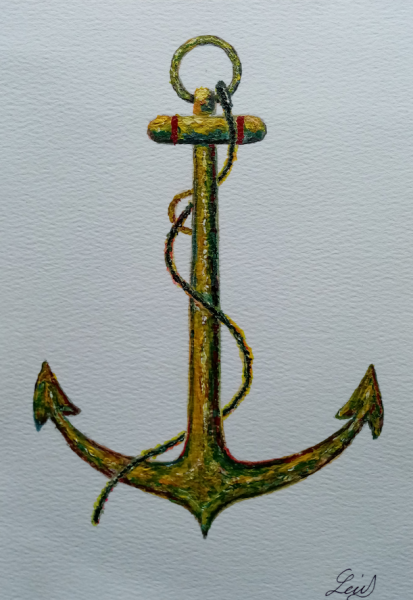
Established 2005 Registered Charity No. 1110656
Scottish Charity Register No. SC043760
DONATE
RECENT TWEETS
Thoughts on the difficulties and stigma people experiencing homelessness face when trying to access healthcare. By Mat Amp
There is this pervasive view in and around the girdle of middle England that casts people on the ‘dole’ and the ‘sick’ as scroungers who are sucking up tax dollars to live the life of Riley. Of course, the plethora of one-size-fits all TV shows that focus on the most unfit and dysfunctional of families don’t help that stereotype. Nor does the portrayal of vulnerable people in the media as work shirkers hell-bent on ringing every dollar out of the ‘hard working man’.
Part of the dynamic is the creation of a desire in the public’s will to exact some sort of revenge on these people who they perceive to be getting something for nothing. Political parties desperately chasing votes, create organisations and campaigns to tackle this ‘fraud’ that often ends up costing way more than they ever end up saving.
This is apart from the fact that encouraging neighbours to dob on each other is reminiscent of policies enacted by Stalin in Russia as he went about locking up and exiling hordes of the country’s population. That may sound dramatic, but how the fuck is it ever going to be right to police your neighbour’s behaviour. Obviously, you don’t turn a blind eye if your nextie is trafficking 12-year-olds into sex slavery but dobbing them in for getting a few illicit dollars back from the tax man is too much. Far too much.
People’s attitude to vulnerable people is one of the major reasons why people in vulnerable positions continue to encounter problems with the system. There is no political will to change these things because they impact a minority of people who tend not to vote. And it is a very British attitude to tell people to stop bitching and moaning when they point to the problems they face in life.
As someone who is in treatment for active addiction, I too often encounter practical barriers to accessing healthcare. For example, I am in full time employment and part of my job is travelling to other cities in the UK for several days at a time. This can make it difficult to pick up my prescription for an opiate substitute: because it has to be picked up on a certain day and if it isn't picked up within the following two days your prescription is terminated and you have to see a doctor and get rescripted.
Also, I can't use the online booking system to book appointments because I have a rolling appointment with my case worker and the system can only handle one appointment at a time. This means I have to book appointments via the phone system and before I got a phone contract I was on a pay-by-the-minute phone, where being put on hold for 20 to 30 minutes could cost me up to £10. When I had an abscess and was desperate to see someone, I spent £14 trying to get through but ran out of credit before I did. I didn't get seen and the abscess got out of control until I needed emergency surgery.
The practical hurdles you face can make you feel vaguely paranoid, like the system is against you, although technically it isn't paranoia, is it, if your fear is justified? And it is in this state that many people experiencing homelessness turn up to medical appointments. We are ready to be slapped down and we often think we deserve to be. So even if we did have the confidence and composure to speak up for ourselves, we wouldn't because deep down inside we are sure we don't deserve to be treated with care and respect. People who think they are not worth caring for need a little bit extra in the form of reassurance, compassion and care. We are easily dismissed but like a parched cactus in the desert we wait for that small drop of rain that will sustain us for the hard dry months ahead.

© Chris Bird
December 2024 – January 2025 : Solidarity
CONTENTS
BACK ISSUES
- Issue 153 : December 2024 – January 2025 : Solidarity
- Issue 152 : October – November 2024 : Change
- Issue 151 : August – September 2024 : Being Heard
- Issue 150 : June – July 2024 : Reflections
- Issue 149 : April – May 2024 : Compassion
- Issue 148 : February – March 2024 : The little things
- Issue 147 : December 2023 – January 2024 : Next steps
- Issue 146 : October 2023 – November 2023 : Kind acts
- Issue 145 : August 2023 – September 2023 : Mental health
- Issue 144 : June 2023 – July 2023 : Community
- Issue 143 : April 2023 - May 2023 : Hope springs
- Issue 142 : February 2023 - March 2023 : New Beginnings
- Issue 141 : December 2022 - January 2023 : Winter Homeless
- Issue 140 : October - November 2022 : Resolve
- Issue 139 : August - September 2022 : Creativity
- Issue 138 : June - July 2022 : Practical advice
- Issue 137 : April - May 2022 : Connection
- Issue 136 : February - March 2022 : RESPECT
- Issue 135 : Dec 2021 - Jan 2022 : OPPORTUNITY
- Issue 134 : September-October 2021 : Losses and gains
- Issue 133 : July-August 2021 : Know Your Rights
- Issue 132 : May-June 2021 : Access to Healthcare
- Issue 131 : Mar-Apr 2021 : SOLUTIONS
- Issue 130 : Jan-Feb 2021 : CHANGE
- Issue 129 : Nov-Dec 2020 : UNBELIEVABLE
- Issue 128 : Sep-Oct 2020 : COPING
- Issue 127 : Jul-Aug 2020 : HOPE
- Issue 126 : Health & Wellbeing in a Crisis
- Issue 125 : Mar-Apr 2020 : MOVING ON
- Issue 124 : Jan-Feb 2020 : STREET FOOD
- Issue 123 : Nov-Dec 2019 : HOSTELS
- Issue 122 : Sep 2019 : DEATH ON THE STREETS
- Issue 121 : July-Aug 2019 : INVISIBLE YOUTH
- Issue 120 : May-June 2019 : RECOVERY
- Issue 119 : Mar-Apr 2019 : WELLBEING
- Issue 118 : Jan-Feb 2019 : WORKING HOMELESS
- Issue 117 : Nov-Dec 2018 : HER STORY
- Issue 116 : Sept-Oct 2018 : TOILET TALK
- Issue 115 : July-Aug 2018 : HIDDEN HOMELESS
- Issue 114 : May-Jun 2018 : REBUILD YOUR LIFE
- Issue 113 : Mar–Apr 2018 : REMEMBRANCE
- Issue 112 : Jan-Feb 2018
- Issue 111 : Nov-Dec 2017
- Issue 110 : Sept-Oct 2017
- Issue 109 : July-Aug 2017
- Issue 108 : Apr-May 2017
- Issue 107 : Feb-Mar 2017
- Issue 106 : Dec 2016 - Jan 2017
- Issue 105 : Oct-Nov 2016
- Issue 104 : Aug-Sept 2016
- Issue 103 : May-June 2016
- Issue 102 : Mar-Apr 2016
- Issue 101 : Jan-Feb 2016
- Issue 100 : Nov-Dec 2015
- Issue 99 : Sept-Oct 2015
- Issue 98 : July-Aug 2015
- Issue 97 : May-Jun 2015
- Issue 96 : April 2015 [Mini Issue]
- Issue 95 : March 2015
- Issue 94 : February 2015
- Issue 93 : December 2014
- Issue 92 : November 2014
- Issue 91 : October 2014
- Issue 90 : September 2014
- Issue 89 : July 2014
- Issue 88 : June 2014
- Issue 87 : May 2014
- Issue 86 : April 2014
- Issue 85 : March 2014
- Issue 84 : February 2014
- Issue 83 : December 2013
- Issue 82 : November 2013
- Issue 81 : October 2013
- Issue 80 : September 2013
- Issue 79 : June 2013
- Issue 78 : 78
- Issue 77 : 77
- Issue 76 : 76
- Issue 75 : 75
- Issue 74 : 74
- Issue 73 : 73
- Issue 72 : 72
- Issue 71 : 71
- Issue 70 : 70
- Issue 69 : 69
- Issue 68 : 68
- Issue 67 : 67
- Issue 66 : 66
- Issue 65 : 65
- Issue 64 : 64
- Issue 63 : 63
- Issue 62 : 62
- Issue 61 : 61
- Issue 60 : 60
- Issue 59 : 59
- Issue 58 : 58
- Issue 57 : 57
- Issue 56 : 56
- Issue 56 : 56
- Issue 55 : 55
- Issue 54 : 54
- Issue 53 : 53
- Issue 52 : 52
- Issue 51 : 51
- Issue 50 : 50
- Issue 49 : 49
- Issue 48 : 48
- Issue 47 : 47
- Issue 46 : 46
- Issue 45 : 45
- Issue 44 : 44
- Issue 43 : 43
- Issue 42 : 42
- Issue 5 : 05
- Issue 4 : 04
- Issue 2 : 02
- Issue 1 : 01
- Issue 41 : 41
- Issue 40 : 40
- Issue 39 : 39
- Issue 38 : 38
- Issue 37 : 37
- Issue 36 : 36
- Issue 35 : 35
- Issue 34 : 34
- Issue 33 : 33
- Issue 10 : 10
- Issue 9 : 09
- Issue 6 : 06
- Issue 3 : 03
- Issue 32 : 32
- Issue 31 : 31
- Issue 30 : 30
- Issue 29 : 29
- Issue 11 : 11
- Issue 12 : 12
- Issue 13 : 13
- Issue 14 : 14
- Issue 15 : 15
- Issue 16 : 16
- Issue 17 : 17
- Issue 18 : 18
- Issue 19 : 19
- Issue 20 : 20
- Issue 21 : 21
- Issue 22 : 22
- Issue 23 : 23
- Issue 24 : 24
- Issue 25 : 25
- Issue 8 : 08
- Issue 7 : 07
- Issue 26 : 26
- Issue 27 : 27
- Issue 28 : 28
- Issue 1 : 01

